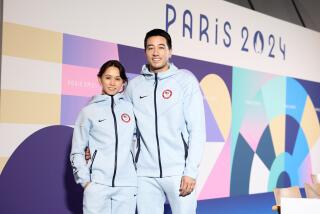Fame, Not Fortune
For a few frantic days in February, Canadian figure skaters Jamie Sale and David Pelletier were two of the world’s most famous athletes.
The pair’s off-ice love story added intrigue to the “Love Story” routine they hoped would win them an Olympic gold medal at Salt Lake City. When they performed a flawless free skate program but finished second to Elena Berezhnaya and Anton Sikharulidze, media and fans cast them as innocents who had been wronged by a bizarre judging system. When the International Skating Union determined that a French judge had been pressured to vote for the Russians and so awarded Sale and Pelletier duplicate gold medals, a rich and happy ending seemed all but written.
Offers poured in from TV networks, magazines eager to put the attractive couple on their covers and advertisers hoping to associate with winners.
“The situation that was thrown at us, there’s no way you can be prepared,” Sale said. “We were surrounded by some great people who kept us grounded.”
But their fame didn’t soar for long.
Instead of starring in their own tour, as envisioned by their former agent, Craig Fenech, they will be one of four pairs on the Stars on Ice tour this winter. Their performance in the Ray Charles Tribute on Ice today at Staples Center--which will be televised Dec. 21 by NBC--is a footnote during a busy sports week instead of the headline event it might have been six months ago.
Certainly, it was inevitable their fame would fade. And they say they’re happy with their choices and lives. They spent much of the spring and summer doing charity appearances and recently started rehearsing with Stars on Ice for their December debut.
“It’s a lot different than the first few months after the Olympics,” said Pelletier, who bought a house with Sale in Edmonton. “Now, there’s way more skating. That’s way more fun for me. I can speak publicly and do whatever stuff sponsors want, but I feel more comfortable on the ice.”
Comfortable is good. Innovative is what Fenech had in mind.
Sale said talk about a tour “wasn’t true.”
“We learned about it when we woke up one morning and heard about it,” she said. “There were some people who wanted to do it, but David and I didn’t want to. And not because we don’t feel we have the star power, but because Champions on Ice and Stars on Ice would be going on at the same time and we’d have to compete against them.”
But Fenech, primarily a baseball agent, said he had arranged a landmark deal the duo undermined by repeatedly negotiating for themselves, which left them prey for the promoters who grip skating in a stranglehold. He said they sat in the library of his New Jersey home and were so enthusiastic about the tour, “Jamie wanted to sign that night and said, ‘Let’s sign right now.’
“I think they had a chance to transcend the sport,” said Fenech, who later sent the couple an e-mail saying their forays behind his back compromised his credibility and negotiating power.
“I had all kinds of things I would have liked to have done with them.... There was a lot of naivete, and I think there were people poisoning the well.”
Fenech said he had ample financial backing for Sale and Pelletier to star in their show. It would have begun in Canada, with some U.S. dates. “The plan was to deal with one of the bigger tours or own their own,” he said, referring to the IMG-backed Stars on Ice tour and Tom Collins’ Champions on Ice company.
“It was a four-year, seven-figure guarantee, and they would have owned 50% of it, which would have made it groundbreaking. The truth is, I’m not sure at the end of the day they were sure they wanted to carry it. It is a lot of responsibility.”
Fenech resigned in May, ending an 18-month relationship in which he secured a contract with skate manufacturer CCM, a deal for the duo to skate in NBC specials and negotiated with Crest for ads that appear in national magazines. They replaced him with Robert Steadward, who described himself as Sale’s “sport counselor” and a family friend.
“I would have given them an equity position,” Fenech said, “which a lot of people didn’t understand. Or they understood and feared it.... Getting subsumed into the Stars on Ice tour definitely diminishes their value.”
Steadward began working with Sale in 1993 while she skated with another partner and continued to counsel her when she competed solo. They parted when she moved to Montreal to train with Pelletier, but hooked up again after the duo won the 2001 world championship and he worked with both. At Salt Lake City, he said, he helped coordinate media relations.
A partner in a number of sports medicine clinics and a former International Olympic Committee member, Steadward fields 20 requests a day for Sale and Pelletier to perform or appear at schools. He negotiated their four-year Stars on Ice deal and completed a contract with Roots, the Canadian company whose clothing was so popular at Salt Lake City.
Fenech denied reports he asked Champions on Ice to pay them $30,000 a show and said he could have completed a deal with Stars on Ice if they’d asked. “I miss them. I liked them very much,” he said.
Like Sale, Steadward said the tour Fenech spoke of was no sure thing for the skaters.
“They had certain interests and wishes, but maybe negotiations weren’t going in the right direction,” he said. “They felt nothing was being accomplished and when were they going to skate? There were so many options.... Things just weren’t getting done at the time. They wanted to skate in both Canada and the U.S. and everything wasn’t getting done to their satisfaction, or wasn’t getting done at all.”
He also disputed Fenech’s contention Sale and Pelletier will be lost in the Stars on Ice cast. The troupe also includes Berezhnaya and Sikharulidze, sustaining the unwitting bond established during the judging scandal.
“I don’t think they’re worried about whether there are two pairs or six pairs,” Steadward said. “They just want to skate to the best of their ability and give back to the community after all the support they got.”
Sale knows she and Pelletier will always be linked to the Russians and, indirectly, to the still-unfolding judging scandal. She said she and Pelletier have not been questioned by the FBI regarding allegations that reputed Russian mobster Alimzhan Tokhtakhunov conspired to fix the pairs and dance events; if questioned, she said, they will say they know nothing about him. Or about French judge Marie-Reine Le Gougne’s alleged misconduct in judging the pairs event.
“There’s nothing we can do,” Sale said of their link to the controversy.
Pelletier has little faith in the ISU judging reforms instituted to avoid repeats of the scandal. According to the proposal, judges will be selected at random from a pool, and their marks will be chosen at random by computer without posting their nationality.
“Is this to protect the judges? I thought we were doing this to protect the skaters from [officials] doing backroom deals,” he said. “Judges have to be responsible. As a skater you’re out there naked on the ice, and if you fall, you fall. Judges should not be hiding. This is a joke. Time will tell. I hope it will work, but I don’t think it will.”
More to Read
Go beyond the scoreboard
Get the latest on L.A.'s teams in the daily Sports Report newsletter.
You may occasionally receive promotional content from the Los Angeles Times.







